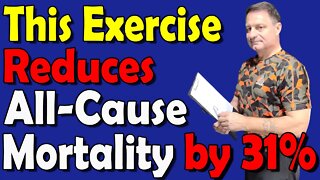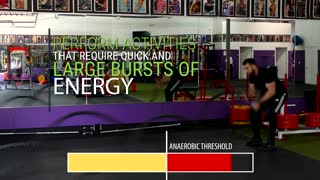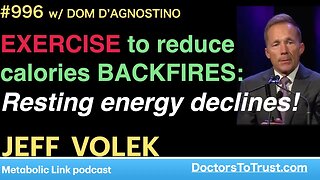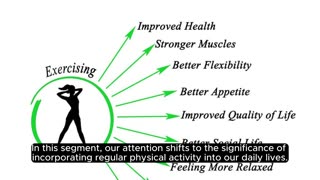2022 Research: Why you DON’T NEED to EXERCISE during the Week
So, could it be true, that we don’t need to bust our humps 3 to 5 or even 6 days a week in the gym or on the track, we can do all we need to do at the weekend.
DoNotAge.org 10% Discount Code: MYNMN (https://bit.ly/2VBDgNt)
Renue by Science 10% Discount Code: MYNMN (https://bit.ly/350ahYM)
I hope you enjoy my content and find it interesting or informative, if so, please consider supporting the channel by signing up to the one you prefer:
*Buy me a Kofi: https://ko-fi.com/mynmnexperiment
*Patreon: https://bit.ly/3hhfjl5
*Subscribestar: https://bit.ly/3psYo23
My Current Anti-Aging Protocol:
• 1.5 grams of NMN (https://bit.ly/3c2Fxt8)
• 1.5 grams of Trans-resveratrol (Tue, Thu & Sat) (https://bit.ly/3yxeqy2)
• 1.5 grams of Berberine (https://bit.ly/3O0v5zq)
• 1.5 grams of TMG (https://bit.ly/3oe1Ted)
• 5,000 IU (International Units) of vitamin D3 (https://bit.ly/3P32hYH)
• 120 mcg (micrograms) of vitamin K2 (Mk 7) (https://bit.ly/3PhkBgn)
• 250mg Magnesium (L-Threonate) (https://bit.ly/3O4pZ5o)
• 200mg high molecular weight hyaluronic acid (https://bit.ly/3P0Z4c2)
• 2,400mg of Fisetin, on the 1st, 2nd & 3rd of each month (https://bit.ly/3P2rSB0)
• 2,400mg of Quercetin, on the 1st, 2nd & 3rd of each month (https://bit.ly/3IzulAy)
• 81mg of aspirin (https://bit.ly/3uFjtem)
https://jamanetwork.com/journals/jamainternalmedicine/article-abstract/2794038
https://pubmed.ncbi.nlm.nih.gov/35788615/
https://discovery.ucl.ac.uk/id/eprint/1539729/1/O'Donovan_Association_Weekend_Warrior.pdf
Thanks to scientists collecting and analyzing vast amounts of data, we now know a lot about exercise, and how it's good for our health and wellbeing. We have data on the optimal time of day to exercise, which may not necessarily be the same for everyone. We know often we should exercise, we know how long it takes to lose our fitness, and what kind of intensity we should be aiming for. Of course many of these are just recommendations, but they are based on aggregated data recorded from thousands of participants, showing what appears to work best for most people. For example they can tell us how much exercise is needed to offset sitting down all day, or how best to keep unwanted weight off, and even how even just one single workout can deliver health benefits.
But if you're like most people, one of the biggest problems is actually finding time to actually do it during the week. In a new international study, researchers analyzed the public health data of over 350,000 people in the USA, it was collected through the National Health Interview Survey (NHIS) between 1997 and 2013. Combing through the data, the team – led by first author Mauricio dos Santos, an exercise physiology researcher from the Federal University of São Paulo in Brazil – had a single question they wanted to explore. Put simply, provided you're doing enough exercise to meet the recommended levels of physical activity each week, does it matter if you do all your exercise in just one or two sessions at the weekend, or is it better to spread the physical activity out regularly during the week? Currently, the World Health Organization (WHO) 2020 guidelines on physical activity and sedentary behavior stipulate that adults should do between:
150 and 300 minutes of moderate intensity physical activity each week, or
Between 75 and 150 minutes of vigorous intensity exercise each week (or an equivalent combination). While studies have previously looked at the health benefits of being a 'weekend warrior', it's remained unclear how doing only one or two sessions of exercise a week compared to doing more frequent sessions of physical activity, specifically in terms of reducing risk of mortality. Thanks to Dr. dos Santos and his team, we may now have a clearer answer. After comparing people in the cohort who undertook the recommended level of Moderate to Vigorous Physical Activity (MVPA) each week, the researchers found very little difference between weekend warriors and the participants who exercised more regularly, in terms of reduced mortality risk from all causes, and specifically from cancer or cardiovascular disease.
DISCLAIMER: This video and description contain discount codes, which means that if you use the code, I will receive a small commission.
FAIR-USE COPYRIGHT DISCLAIMER
Copyright Disclaimer Under Section 107 of the Copyright Act 1976, allowance is made for "fair use" for purposes such as criticism, commenting, news reporting, teaching, scholarship, and research. Fair use is a use permitted by copyright statute that might otherwise be infringing. Non-profit, educational, or personal use tips the balance in favor of fair use. #Detraining #FitnessMotivation #Sarcopenia
-
 9:43
9:43
My Longevity Experiment
1 year ago2022 Research: How to Reduce All-Cause Mortality by 31% with Exercise
58 -
 9:26
9:26
My Longevity Experiment
11 months agoThis Can’t be True | NEW TYPE of Exercise Prolongs Life (Longevity)
26 -
 0:34
0:34
cheloufitt
1 year agoExercise and Health: How Many Times a Week Should You Work Out?
8 -
 0:58
0:58
Doctors To Trust
1 year agoDrew Baye. Vast majority of people do not workout...-they believe must spend 150min/week in the gym
6 -
 1:00
1:00
sergeantmatcscs
5 months ago20240129 Day 659 Part-3 - FAQ: “How Much Cardio Should I Be Doing?”
311 -
 1:00
1:00
sergeantmatcscs
4 months ago20240225 Day 686 Part-3 - The Power of Exercise
6 -
 13:41
13:41
Elibigdick
1 year ago8 Things Nobody Tells You About Cardio
124 -
 3:04
3:04
Doctors To Trust
11 months agoJEFF VOLEK b | EXERCISE to reduce calories BACKFIRES: Resting energy declines!
41 -
 1:42
1:42
budi3113
7 months agoEmbracing Physical Activity
4 -
 13:18
13:18
Dr. Eric Berg
1 year agoThe Dangers of Exercise (ex. Death)
5763